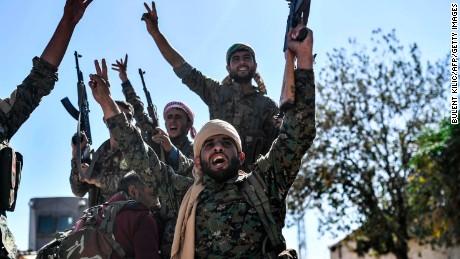
Can ISIS terrorists survive the defeat in Raqqa?
As the last remaining ISIS fighters are hunted down in Raqqa after a four-month Kurdish-led and US-backed offensive, some are heralding the group’s final defeat, three years and four months after it declared its ‘Caliphate’ across Syria and northern Iraq.
But while its impending territorial defeat is significant, reports of ISIS’s death are wrong.
You can’t kill an idea. Especially when the group has laid down deep ideological roots through its “Islamic state,” building a flourishing global network and a considerable online presence.
The group has also been here before. After the death of former-leader Abu Musab al-Zarqawi in 2006, ISIS’s predecessor organisation faded into the shadows until the conditions were ripe for its return.
ISIS’s loss of territory in Syria and Iraq will therefore likely see the group shift its operational outlook from state-building to survival, reverting back to the insurgency model that characterised its operations before 2014.
The loss of Raqqa will do little operationally to deter attacks in the West, and is unlikely to have an impact on the group’s ability to inspire global jihadi violence. ISIS will continue to try and encourage attacks internationally, with recent trends showing an uptick in low-tech, low-budget terrorism in Europe and North America.
Tactics employed by small cells or lone attackers have become less sophisticated; employing crude stabbing and ramming attacks which are simple to carry out, and require little preparation or coordination from overseas.
Lone attackers are likely to be involved with domestic networks of ISIS sympathisers and supporters, providing a social environment that incubates the ISIS ideology, but not necessarily directly connected to the group’s operatives in Syria and Iraq.
However, the recapture of ISIS strongholds will lessen the group’s capacity for directly coordinating terrorist attacks, and will likely reduce the quality and quantity of its propaganda output.
Furthermore, the image of a “defeated” group might deter would-be attackers wavering about the religious legitimacy of ISIS’ message, who might previously have been won over by its credible narrative of military success.
ISIS channels will do their best to remedy this view. Even as it loses its final city strongholds, the jihadi group’s ideological fluidity means that its narrative and propaganda is likely to shift.
Similar to how ISIS justify violence against Spain because they defeated the then “Caliphate” in 1492, such setbacks will be framed as part of a divine will. The West’s destruction of the “Caliphate” will be lamented by jihadis for years to come and used as a further call for violence.
Propaganda has pre-empted this eventuality, its Dabiq magazine has attempted to draw parallels between the global alliance against ISIS, and coalitions of enemies at the time of the Prophet Muhammad determined to destroy Islam.
With the group militarily defeated, a key question for policymakers is how to prevent another jihadi force emerging from the ashes.
First, it is essential that ungoverned spaces are secured and services delivered to war-ravaged communities. Through its exploitation of social tensions, inequality, ineffective governance, and corruption, ISIS presented itself as the only viable option to provide for communities. It is essential that the Kurdish-led SDF that captured Raqqa are not seen as an invading force, and so representative, locally-led forces will be essential for communities have a stake in their own security.
The second task is to tackle ISIS as an ideology, not just a group. The Salafi-jihadi worldview espoused by ISIS is both transnational and transgenerational. Defeating it cannot be done through military means alone.
Salafi-jihadi ideology preys on genuine grievances and exploits religious scripture to present its “Caliphate,” underpinned by a strict interpretation of Sharia law, as the only viable form of governance. In many cases it is seen as the lesser of two evils.
The evolution and flexibility of this worldview must be acknowledged. Across Syria, in Idlib province, al Qaeda-linked militants have embarked on an alternative Islamic state project, entrenching itself in communities, and positioning itself within the complex patchwork of rebel groups. This faction and others like it across the Middle East and Africa will likely remain for years, underpinned by the same set of values and objectives as ISIS.
But ISIS’s real permanence will be in the online space, where the group has revolutionised jihadi communications through its extensive propaganda output, both in its content production but also the complex distribution channels developed by the group’s sympathisers.
The group’s propaganda includes slick looking magazine and videos but also extends to textbooks, governance manuals, theological texts, newspapers, and radio bulletins. Despite increasingly successful campaigns against ISIS content online by governments and tech companies, the group has rewritten the strategic communication rulebook, and continues to evolve and adapt its content and means of distribution.
ISIS’s main strength online is in immortalising its ideologues. The death of jihadi ideologues like Abdullah Azzam, Osama bin Laden, and Anwar al-Awlaki have not resulted in stopping their Salafi-jihadi ideas from spreading. The ideological legacy of such figures continues to survive. While leaders can be replaced, ideas remain constant.
Remaining coalition operations will likely focus on rounding up ISIS’s surviving military and religious leadership.
For the time being at least, ISIS continues to be led by the figurehead of ‘Caliph’ Abu Bakr al-Baghdadi, the self-declared Commander of the Faithful, who likely remains alive having issued an audio recording last month.
But even when he is inevitably killed or captured, Baghdadi will enter the pantheon of jihadi leaders who will continue to inspire violence.
Similarly, the shadows of ISIS will continue to haunt the Middle Eastern and Western cities long after it is cleared from strongholds like Raqqa.
Source: Newsweek





